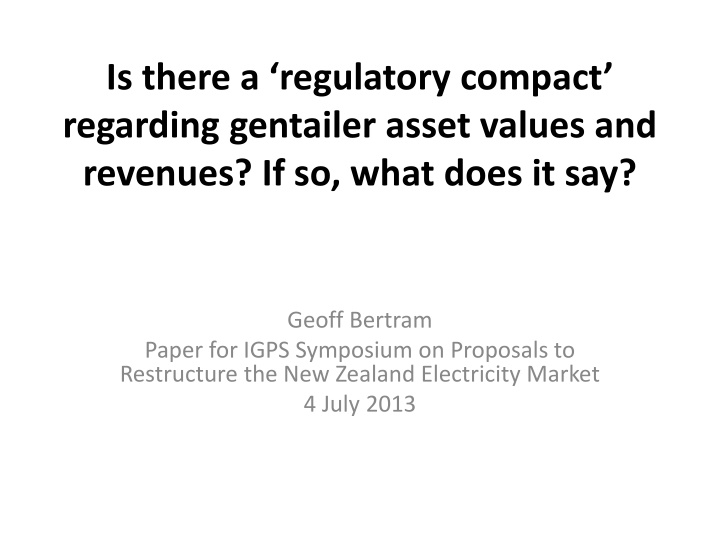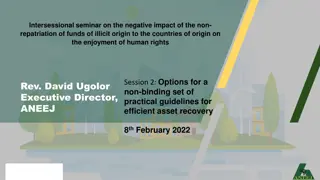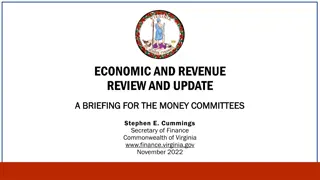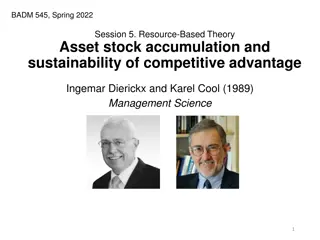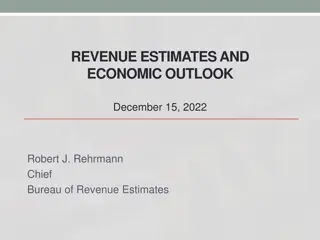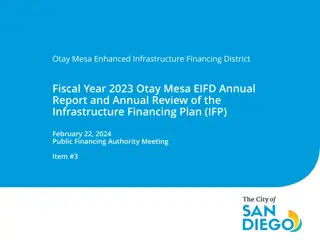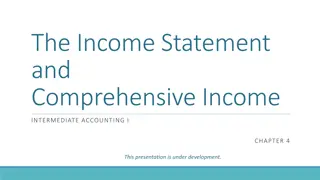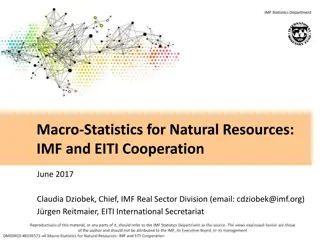Regulatory Compact Concerning Gentailer Asset Values and Revenues
Gentailers in New Zealand are accused of overcharging residential consumers, leading to excessive profits capitalized into asset revaluations. These revaluations, totaling around $11.4 billion, are seen as a wealth transfer from consumers to owners. Suggestions include rolling back revaluations to historic costs for consumer benefit and potential regulatory interventions.
Download Presentation

Please find below an Image/Link to download the presentation.
The content on the website is provided AS IS for your information and personal use only. It may not be sold, licensed, or shared on other websites without obtaining consent from the author.If you encounter any issues during the download, it is possible that the publisher has removed the file from their server.
You are allowed to download the files provided on this website for personal or commercial use, subject to the condition that they are used lawfully. All files are the property of their respective owners.
The content on the website is provided AS IS for your information and personal use only. It may not be sold, licensed, or shared on other websites without obtaining consent from the author.
E N D
Presentation Transcript
Is there a regulatory compact regarding gentailer asset values and revenues? If so, what does it say? Geoff Bertram Paper for IGPS Symposium on Proposals to Restructure the New Zealand Electricity Market 4 July 2013
My recent arguments summarised Gentailers have been gouging the most dispersed and powerless consumer group residentials to secure excess profits Those excess profits have been capitalised into revaluations of fixed assets on the companies books The size of the revaluations (around $11.4 billion) indicates excess profits (rents) well in excess of $1 billion per year, relative to what residential consumers could have been paying under old-fashioned rate-of-return regulation These rents are far in excess of what has been needed to fund new and replacement investment, even in an energy- only market
My recent arguments summarised (2) Residential and small-business consumers lack countervailing power against what is effectively a gentailer cartel, and government has been missing in action Rolling back the revaluations to historic cost would reveal the full extent of excess profits and hence the scope for price regulation to yield benefits to consumers The $11.4 billion of revaluations is basically a bare wealth transfer from consumers, serving no economic purpose other than to enrich the owners of the generation assets. In principle, a lump-sum reversal of that wealth transfer would be possible now without disturbing the operation of the electricity market.
Book value of gentailer fixed assets decomposed between historic cost and revaluations Historic Cost Revalua tions Total book value Revals as % of book value + = $million $million $million 56 34 55 39 Mighty River Genesis Meridian Contact Trustpower (2013) 2.2 1.7 3.6 3.2 2.8 0.9 4.4 2.0 5.1 2.6 8.0 5.2 48 1.4 1.3 2.7 49 Total 12.1 11.4 23.5
My recent arguments summarised (3) Until April 2013, two-thirds of the revalued assets and 71% of the revaluations were in Government ownership, so the New Zealand community have gained, as taxpayers, much of what they have lost as consumers. Reversing 71% of the wealth transfers would have been easy prior to the part-privatisation programme: the Government balance sheet would have been weakened for the benefit of 1.7 million private households. Reversing the other 29% of revaluations would have impacted on the private owners of Contact Energy and Trustpower, raising interesting issues (that I want to deal with in this paper). Part-privatisation of the SOEs will leave only one-third of total assets and revaluations in state hands, with the rest held by private investors. Reversing the past decade s wealth transfers from consumers will then impact primarily upon private parties, sharply raising the political stakes and bringing on a debate about regulatory takings .
The Electricity Authority response Brent Layton, The Economics of Electricity, 4 June 2013, makes three points criticising my position: He does not like the way I present the price-trend data (though he agrees about the trend) He says my claim of inflated asset values is a myth (but does not deny the scale of the revaluations just the view that they are inflated) He argues that an implicit regulatory bargain, entered into about 1999, rules out any clawback of the past decade s windfall revaluations
Inflated asset values, Dr Layton says, are a myth because 53 ..[Gentailers] are not regulated entities with market power setting their prices off their own asset valuations. There are five major generators and a whole lot of others as well, and the barriers to entry into being a generator are low. 54. The generation market is workably competitive and, in such a market, prices are set by the interplay of supply and demand. Prices determine the returns parties receive for output and returns determine asset values and not vice versa. 55. The claims that generators are using asset revaluations to ratchet up prices are based on confusion over what determines asset values in a regulated market with what determines them in a workably competitive one. Layton 2013 p.15 I disagree, but save this for another occasion (but see my IGPS seminar presentation of 24 May 2013, Asset revaluations, price gouging, and barriers to entry: the state of play in electricity sector non-regulation )
The regulatory bargain 45. In order to remove past windfall gains from existing generators it would be necessary to make decisions to transfer wealth from them to consumers and bear the undesirable chilling effects this would have on the willingness of parties to invest in future in electricity and probably other sectors. 49. A variant on the previous criticism is that most of New Zealand s older hydro-generation assets were built a very long time ago by the government (by the NZ Electricity Department, or NZED) and have been fully depreciated and paid off. According to those promoting this criticism, there is no need to include any payment for the cost of capital in the price of electricity produced from these plants. 50. The problems with this reasoning are that NZED s generation assets were transferred to SOE s and/or privatised on the basis of their earning capacity at the time of the transfer. Moreover, they were transferred on the basis that the new owners would receive the benefits of any unexpected increases and bear the costs of any unexpected decreases in electricity prices subsequent to the transfer. 51. To now determine that the return on capital will be set by regulators, and windfall gains and losses will not be permitted, breaches the implicit regulatory bargain entered into by the Crown when it transferred the assets. It can be open to a regulator to do such a thing, but the consequence would be to have a chilling effect on investment in the electricity sector, and probably elsewhere. This would not bring long-term benefits to consumers. Layton 2013 pp.13-14, emphasis added
First key plank of the supposed bargain: The asset valuations of the new generation companies were set to capitalise their earning capacity at the time of the transfer. Absolutely correct. Mighty River, Genesis, and Meridian Energy all undertook fair value exercises to re-set their fixed asset values as at April 1999 when they took over the assets from ECNZ (The actual sale-and-purchase transactions were at ECNZ s historic-cost book values, and all three SOEs were required to re-set their asset valuations to fair value afterwards). Contact Energy actually conducted a write-down upon assuming control of its assets in 1996 but thereafter undertook regular fair-value revaluations starting in 1999 Trustpower moved to market-value valuation in 2001, after initially carrying its fixed assets at acquisition cost. These early valuations suggest no expectation that prices and revenues would rise dramatically in the foreseeable future
Second key plank in Laytons supposed bargain: subsequent increases in prices and asset values were unexpected and hence can be described as windfalls , which the new owners were fully entitled to enjoy without any fear of subsequent clawback Were the revaluations unexpected windfalls , or the result of the new owners deliberately shaking the tree once they had got their hands on it (that is, post-contractual opportunism )? This is central to the issue of whether the revaluations were consistent with any implicit regulatory bargain to which the Government, as original owner, must presumably have been a willing party.
What did the Government party reasonably expect price and asset-value outcomes to be under the regulatory bargain? There is an extensive, and very explicit, record of what the Government of the day expected to happen, back in 1997-1999 when the ECNZ assets were transferred The two key outcomes intended from the Bradford reforms were Lower prices, especially to residential consumers Greater choice of retail supplier for consumers If there was an implicit bargain, it must have involved the gentailers dropping prices, especially for residential consumers
Hon Max Bradford, 16 September 1997, Hansard Vol.563 p.4289 we have kept our options open to ensure that we are able to deliver lower real prices to household consumers. We will do that in whatever way we can.
Hon Max Bradford, 19 May 1998, Hansard Vol.558 p.9151 The electricity reforms are about getting a better deal for all consumers. They will deliver choice and lower electricity prices. In this way the Government is also seeking to improve significantly our international competitiveness by lowering the energy costs for business.
Hon Warren Kyd (National, Hunua) 19 May 1998 Hansard Vol.558 p.9156 The idea behind this legislation is to lower the cost of electricity for people, for workers, for widows, for children, and for business. They will be able to get cheaper electricity because of this Bill. . [I]f we have true competition the cost of energy for businesses will be lower and they will become more internationally competitive. That is the compulsion for this legislation. That is the need for urgency. This legislation will allow domestic consumers and our businesses to get cheaper power so that we can be more competitive internationally.
Hon Peter Brown (NZ First) 19 May 1998 Hansard Vol.558 pp.9159-9160 the coalition Government is committed to delivering a better deal for ordinary New Zealanders. The driving force behind this reform is the delivering of lower prices for electricity consumers We are proposing to split ECNZ into three competing State-owned enterprises. This will lead to greater competition in wholesale electricity and a fall in wholesale prices. The result will be lower prices for consumers . We believe that the three-way split will pave the way for greater choice and lower power bills for consumers. New Zealand First acknowledges that some in the electricity industry have a number of concerns in relation to this bill, but we have decided that those concerns must be balanced against the long-term benefits to consumers and the economy as a whole. The reforms contained in this Bill will deliver these benefits to those domestic consumers who have so far not benefited from the gains made by earlier reforms.
Hon Bob Simcock (National) 19 May 1998 Hansard Vol.558 p.9162 I want to state some simple facts. These reforms are occurring because we want to reduce the price of electricity to consumers.
Hon Gerry Brownlee (National) 30 June 1998 Hansard Vol.558 p.10368 I am pleased that this Government is about the business of lowering electricity prices for New Zealand consumers.
Electricity Industry Reform Act 1998 2.The purpose of this Act is to reform the electricity industry in order to better ensure that (a)costs and prices in the electricity industry are subject to sustained downward pressure; and (b)the benefits of efficient electricity pricing flow through to all classes of consumers.
Hon Bill Birch (National) 30 June 1998 Hansard Vol.558 p.10555 Five years ago the then board and management of ECNZ advised Government Ministers they could expect that the real price of electricity would continue to increase at 2 percent a year. The Government at that time decided to embark on a series of reforms of the electricity sector because we were convinced that it was unnecessary for the consumers of electricity in this country to face those sorts of real price increases. It was our firm belief that by introducing more competition into the electricity sector, both in relation to generation and in relation to distribution and retail, we could not only reduce prices to the consumer, but drive down the cost of supplying electricity .
Hon John Luxton (National) 30 June 1998 Hansard Vol.558 pp.10569-10570 People in the market place have worked out that power prices will be lower .. I have to say that unfortunately the same thing will happen to the Government s balance sheet. As ECNZ is split up and as competition comes into the market place, it will take some money off the Government s balance sheet .. [T]he return on power assets will be lower, because power prices will be lower for ordinary New Zealanders. That is why the Government is making these changes
Marta Steeman, Power reform hits credibility snag, Dominion 10 April 1999 CONSUMERS will be rightly considering whether the much-trumpeted benefits from the huge changes to the electricity industry are a figment of Commerce Minister Max Bradford's imagination after TransAlta announced big power price rises for more than half a million customers. The Government has only itself to blame for building up consumer expectations of price reductions. At important steps along the way of the reform process, the Government has taken the opportunity to sell the changes as bringing wholesale electricity price falls of 10 per cent and, by implication, falls in prices to consumers. Now the electricity reforms have struck a credibility problem only days after the official split of the Electricity Corporation into three smaller businesses. Consumers can probably be persuaded that the reforms will take time to deliver benefits and to expect price falls over time, but price rises are not part of the bargain. [emphasis added]
So outcomes 2000-2012 do not match the stated expectations on the Government side of the bargain What, exactly, was unexpected about the windfall gains of 2000-2012? They were not unforeseeable, if the gentailers were left free to act opportunistically and then did so The expectation seems to have been that foreseeable increases would be forestalled by gentailer restraint under light-handed regulation The disappointment of that expectation looks very like a breach of the implicit regulatory bargain by the industry
True windfalls are gifts of nature that fall unexpectedly from the sky, to be appropriated by whoever finds themselves by chance to be underneath the tree at the time. The term does not apply well to the outcome of a deliberate process of price-gouging of vulnerable captive consumers, with the resulting transfers of wealth from the poor crystallised as book-value revaluations - even when those revaluations enjoy formal legitimacy under generally accepted accounting practice.
Recapturing from the gentailers the chunk of wealth they have extracted from consumers is inevitably going to be characterised as expropriation or a taking But the credible threat of retrospective clawback is central to effective light-handed regulation Recall that the Electricity Authority itself was been obliged to embark on such retrospective, ex-post reversal of undesirable wealth transfers in the case of the Undesirable Market Transaction (UTS) of 26 March 2011. Is there a statute of limitations in the implicit regulatory bargain covering gentailer prices and asset values?
Rolling book values back to historic cost will involve wealth transfers Defenders of the status quo argue that such transfers which they will no doubt label a taking - will have a chilling effect on large- corporate investment This may well be true: wealth transfers usually chill the losers while they warm the winners which is why I have never agreed with that old Treasury notion that wealth transfers are welfare-neutral The transfer since 1999 of $11.4 billion of household wealth to the gentailers balance sheets has certainly had a chilling effect literally, as houses go unheated, kids suffer respiratory illnesses, and rising power bills squeeze households ability to pay for other basic needs Reversing that transfer will be controversial properly a matter for the Parliament and thus the electorate So the Labour-Greens policy initiative in advance of the next election campaign is to be applauded and welcomed
